Skin of Evil
Oh no, a giant oil slick monster has killed Lieutenant Yar! Well, at least security on the Enterprise is certain to improve
Worf and Yar share a tender moment on the bridge, and the music makes it clear that this event is significant. Surely not a relationship between our Security Chief and Tactical Officer...? But then Counsellor Troi's shuttle gets into trouble, and Engineer of the Week is tied up with some dilithium crystal nonsense, so we move on. Eventually, we make it back to Sound Stage 16, which now includes part of the hull of a crashed shuttlecraft and some black goo. Wait - a humanoid swamp thing is rising from the goo, and straight away it's killed Lieutenant Yar! (Cut to Worf. Were they really trying to suggest a relationship here…?) Dr Crusher tries to save Yar's life, but there's a giant strawberry birthmark in the shape of a cartoon splat on her cheek, so the situation is hopeless.
The goo creature switches its attention to torturing Troi, which frankly is like phasering fish in a barrel. Troi realises that the monster thrives on suffering - how lucky for it that it has her as captive, because nobody on the Enterprise-D suffers quite like Counsellor Troi! Worf is promoted to Acting Chief of Security, and almost instantly everyone feels far safer. Let's send another away team to the surface so the creature can torture them like a schoolyard bully too, including LaForge, who gets to play at being Velma from Scooby Doo (“my glasses…!”).
Troi learns the goo is made from the negative emotions of some unknown species that cast it off like an unwanted cast member, and this upsets the monster so much that it swallows up Riker. Then it gets bored and spits him out. Picard decides to beam down and lecture the monster to death, which is a fool-proof plan. They could also have invited Armus to Lieutenant Yar's astroturf funeral, so it could cringe itself to death.
Words
'Evil' is a key concept in the script, and it is used rather interestingly. The monster, Armus, calls itself evil, yet Picard denies this claim.
Shall I tell you what true evil is? It is to submit to you. It is when we surrender our freedom, our dignity instead of defying you. Do what you will. We will take the consequences.
This is a great moment for Picard, and indeed possibly the only good piece of writing in this episode. It is also a concept worth thinking about. As an allegory for everything from schoolyard bullying to terrorism or government suppression of human rights, the idea that true evil is compliance with the maliciousness of oppressors is a wonderfully bold claim. Right here in four sentences is Roddenberry's vision for a future humanity that is greater than our present. The screenplay is credited to Joseph Stefano and Hannah Louise Shearer, with the story credit going to the former, but I rather suspect Shearer's rewriting added this nice touch, but we'll never really know.
Interestingly, the script calls the alien 'the Black Shroud', which makes it odd that it needed a name at all. According to the June 1997 issue of Star Trek Communicator, Armus was "fondly named after" writer Burton Armus, who would become a producer for the first twelve episodes of season two. It really feels like there might be another story here, but what it is remains a mystery...
Acting Roles
This is supposed to be the dramatic swansong for Denise Crosby's Lieutenant Yar, and still the writing team simply cannot be bothered to do anything with her character. A brief 'shipping tease' with Worf in the opening credits, a terribly saccharine farewell speech on the holodeck... honestly, you do start to appreciate why Crosby wanted out.
They treated this character with a total lack of respect, gave her nothing to do but fail miserably, and spent more time on her haircut than her character development. Crosby says she doesn't regret leaving the show, even knowing how huge it was to become later on, and frankly I believe her.
Meanwhile, let's welcome the newest member of the revolving door engineering department, Walker Boone as Lieutenant Commander Leland T. Lynch. There sure are a lot of members of the crew with 'T' as an initial... Lynch will get mentioned one other time in the show, but we won't ever see Boone again. He is our final Engineer of the Week. I have no idea why they bother with his scenes in the first act of this episode, because it goes absolutely nowhere and by the second act he’s collected his paycheque and gone home. Lynch feels utterly redundant in every conceivable way. Fortunately, the engineering lucky dip is now closed. In just a few episodes time, LaForge is going to get the promotion he deserves, and the show is finally going to get the Chief Engineer it always needed.
Models, Make-up, and Mattes
The Armus special effects are ambitious, but unsatisfying. When it moves around, it's clearly something painted onto the shot in post-production…
…but when we see it in close-up it's evidently a trough of oily liquid because there's a gap between the liquid surface and the floor of the set. It all rather undermines the impact of the monster, unfortunately.
Do spare a thought for the poor performer under the rubber sheet used for this effect, though. He could only breathe for about a minute - Denise Crosby apparently spent most of her time on set worrying about somebody getting injured by this kit (since Jonathan Frakes also had to take the risk of going without air for a while during some of his scenes).
This is the penultimate appearance of Sound Stage 16 (AKA "Hell Planet") in season one, and the shuttle wreckage is a nice touch (we only just got the shuttlecraft and already we can crash one - hooray!). This set does get much, much better as the show progresses - even my kids were able to spot this as a reuse of the set from "Hide & Q" and although I am training them to spot matte paintings, they don't usually pick up on this sort of detail.
Finally, I tip my hat to the one practical effect that pays off - when they use a wire to yank Denise Crosby across the set. I know that Yar's death is supposed to have been meaningless, but at least she gets to go out with a good old fashion piece of stagecraft.





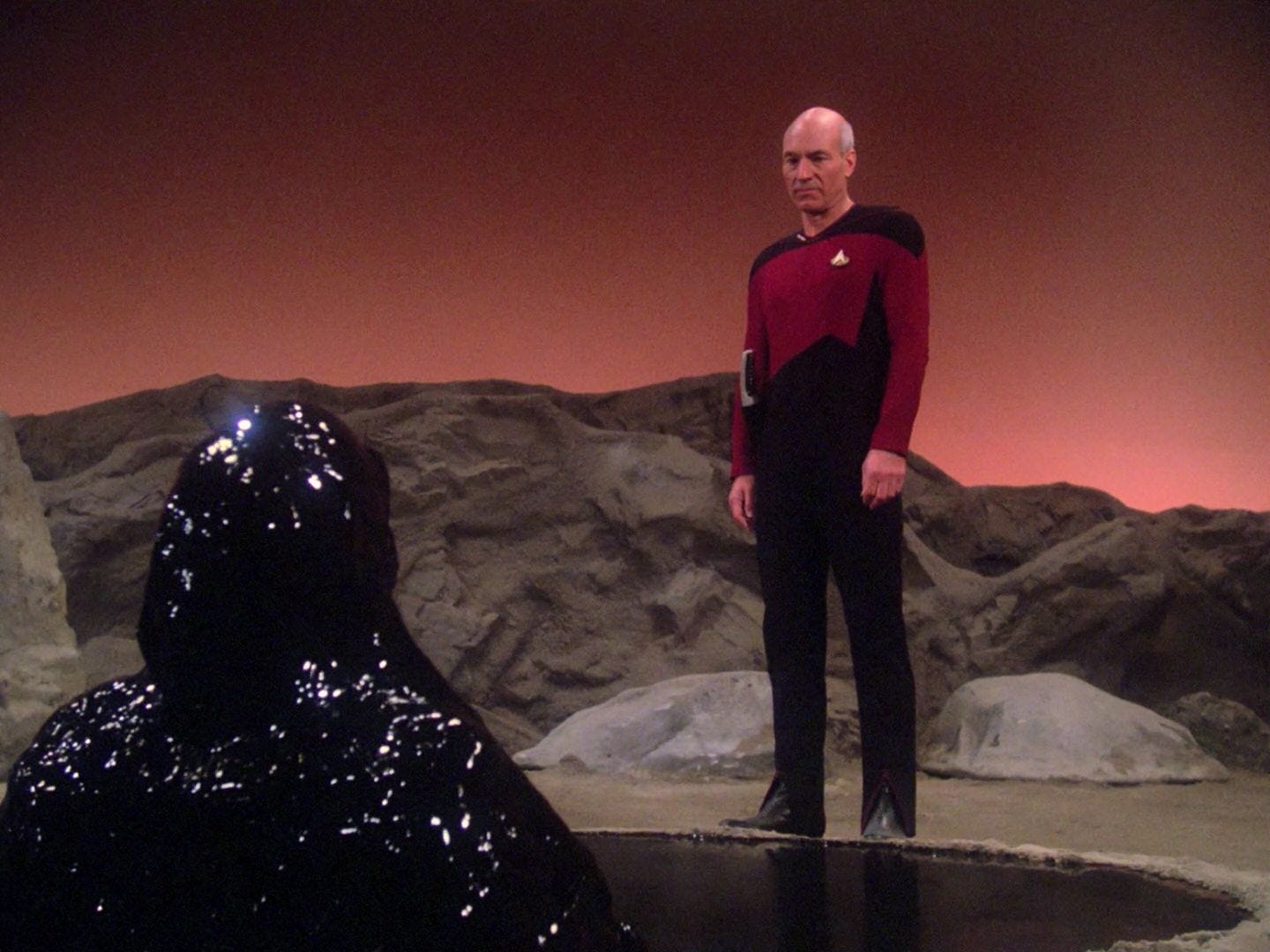

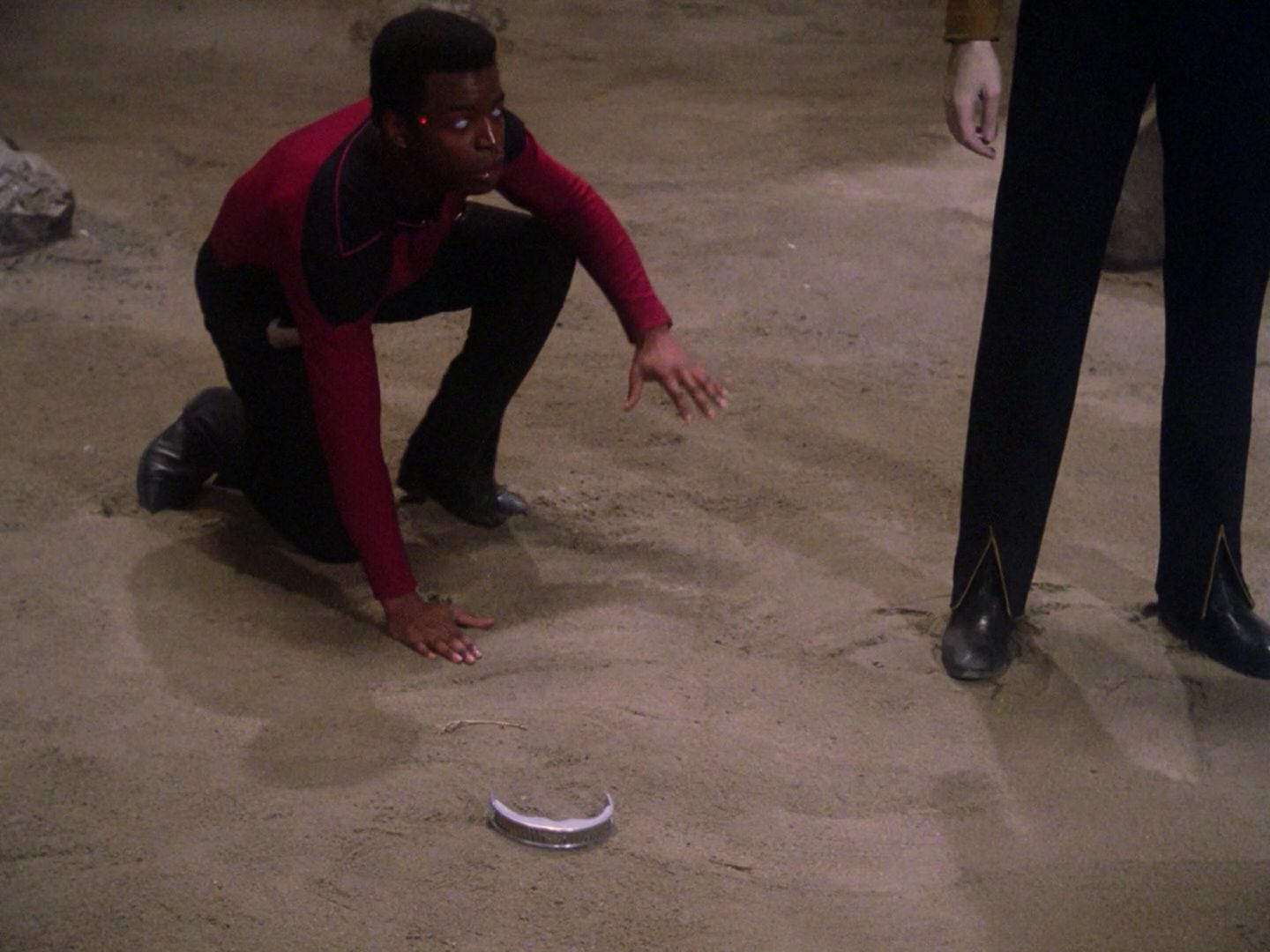

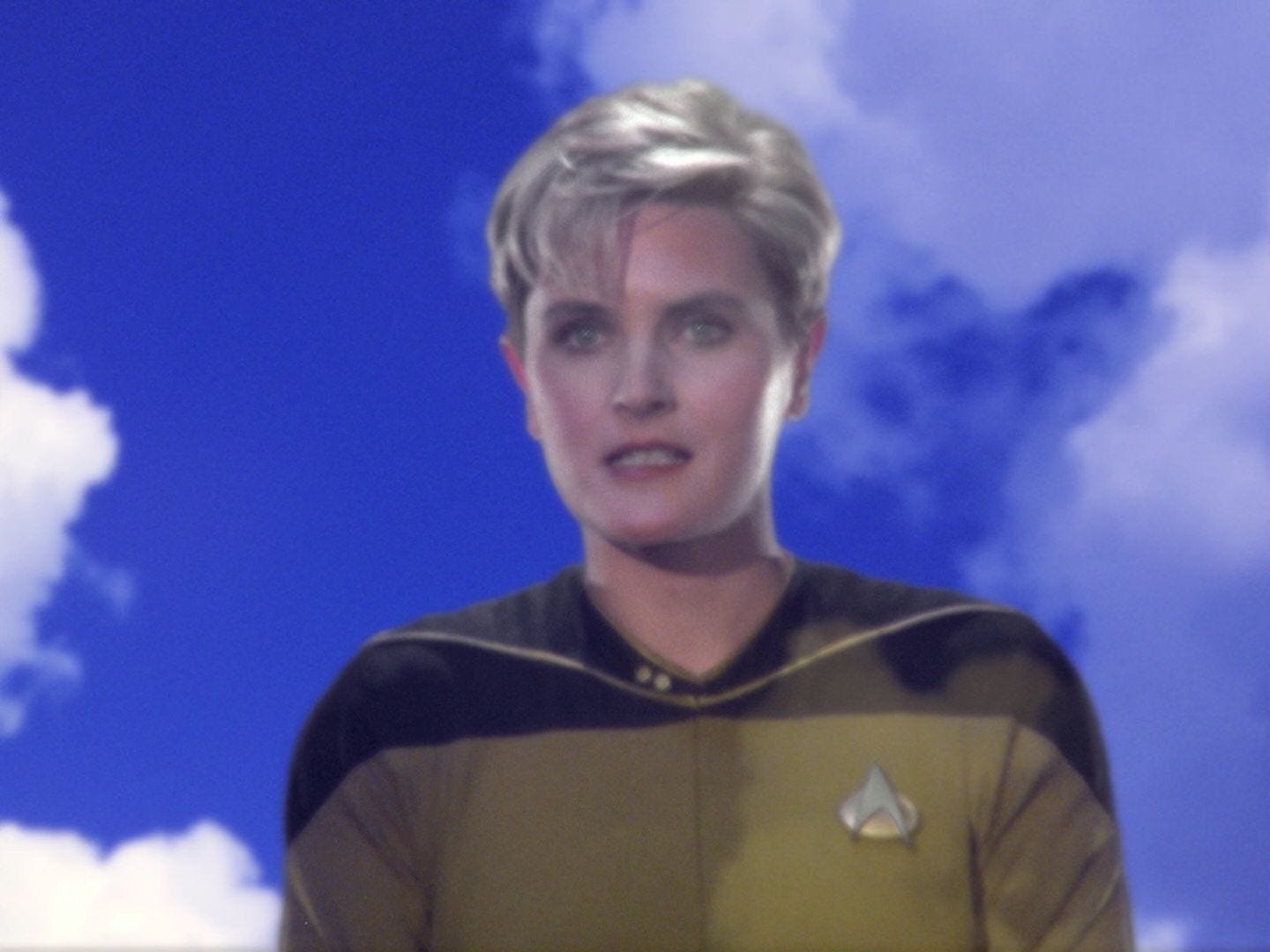
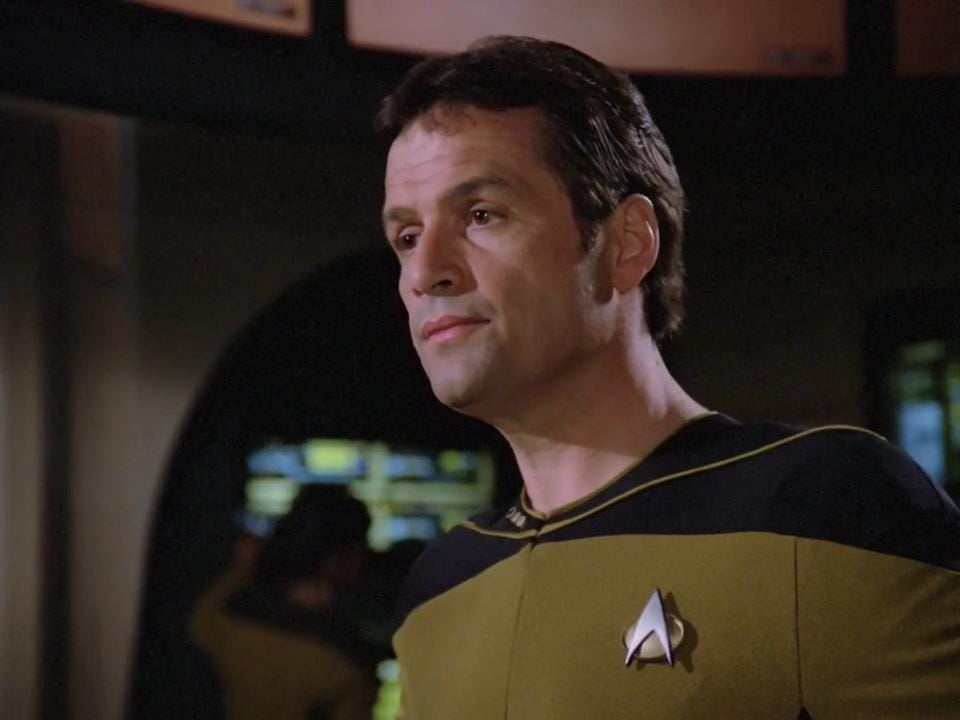



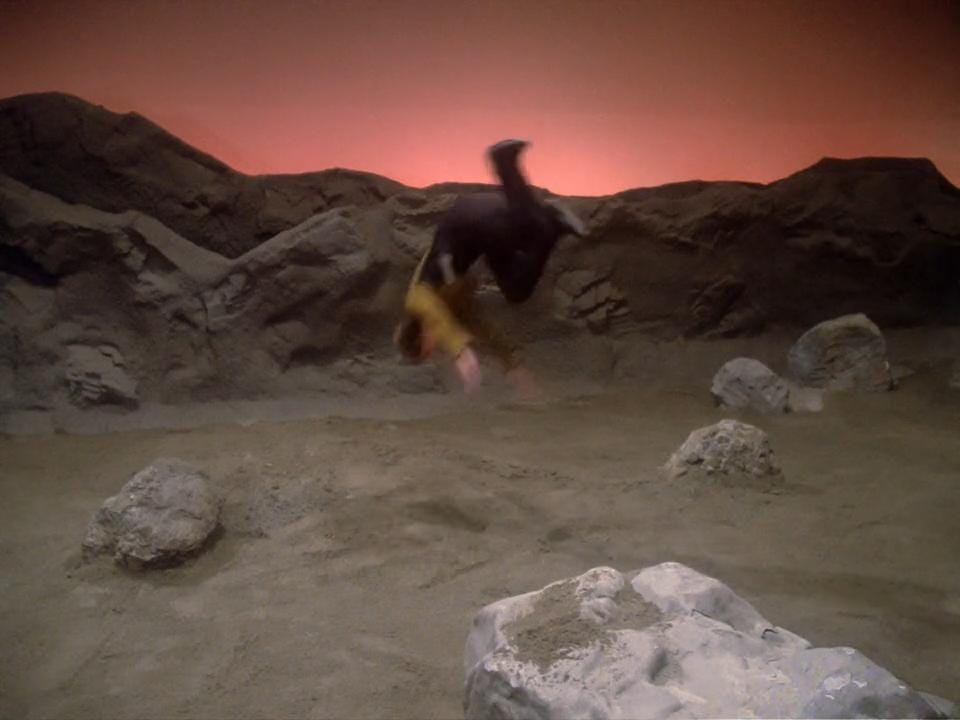
Poor Denise Crosby. She was right to get out, I mean, her character might have gotten better as the show progressed but we don't really know what was going on behind the scenes. Certainly on screen it was a mess and good for her for not putting up with it.